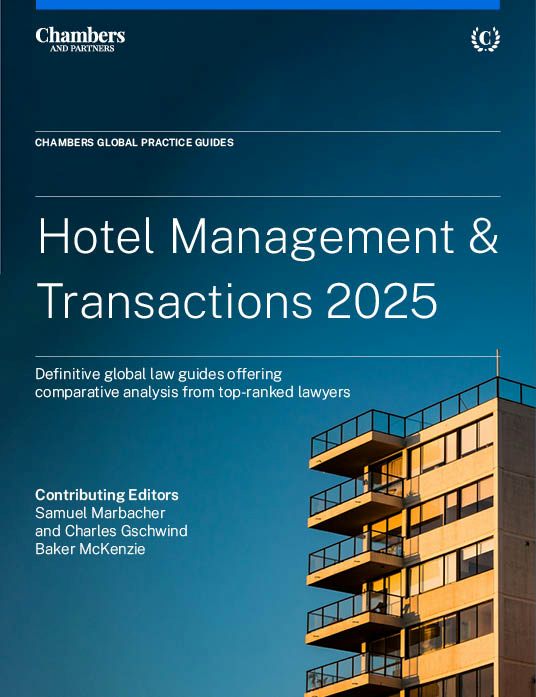
Hotel Management & Transactions 2025
The new Hotel Management & Transactions 2025 guide provides the latest legal commentary and up-to-date information on common hotel sale and purchase structures and the different types of hotel ownership and management ‒ as well as the tax implications, employment law requirements and available financing options for hotel transactions ‒ across a number of jurisdictions spanning Europe, Asia, the Middle East, and the Americas.
Last Updated: June 25, 2025
Compare law and practice by selecting locations and topic(s)
Select Locations

Select Topic(s)

Please select at least one location and one topic to use the compare functionality.
The Global Hospitality Sector: Recovery and New Dynamics
As of 2025, the global hospitality sector is navigating a complex landscape shaped by economic volatility, shifting travel behaviours, regulatory developments, and technological transformation. While capital markets remain cautious, investor appetite for hospitality remains resilient, particularly in markets offering legal transparency and demand stability. JLL (Jones Lang LaSalle) reported that global hotel investment volume in 2024 rose to USD57.3 billion, with Europe and Asia-Pacific capturing a significant share of cross-border capital. The firm anticipates another increase in 2025 of 15 to 25% in volume.
Legal infrastructure, predictability of returns, and operational innovation continue to be the key differentiators between high-performing markets and risk-sensitive markets. Major jurisdictions are drawing attention from institutional and strategic investors alike. Baker McKenzie has been involved in several of the more structurally complex transactions across these markets, supporting clients in cross-border structuring and operational transitions.
2024 global trends and results
Market recovery and performance
According to JLL, global RevPAR (revenue per available room) increased by 4% in 2024 compared with the previous year. Pre-pandemic levels have been exceeded by 12%, according to JLL ‒ resulting in recovered pre-pandemic levels, with full restoration and growth in several markets such as Europe, the Middle East, and the Americas. The Middle East and North America outperformed, driven by high leisure demand and a rebound in corporate travel. Major anchor events including COP28 and the Dubai Airshow contributed to elevated booking volumes in the region, according to Smith Travel Research (STR). Across most countries, the year 2025 started with a record double-digit growth in RevPAR, according to STR.
In general, the recovery trajectory will be further supported by government-led tourism campaigns and high-profile events, including Art Basel Hong Kong and the F1 Grand Prix in Singapore (as was the case with the Formula 1 races in 2024, according to STR). A shift in consumer preferences towards longer, higher-spend stays resulted. According to the Financial Times, the luxury hospitality segment in leading European cities has significantly exceeded pre-pandemic performance. In destinations such as Paris and Milan, average daily rates (ADRs) have increased by more than 40% compared to 2019, driven by sustained demand for premium experiences and high-end service. In response, major hotel groups are scaling their expansion plans, with some aiming to triple their portfolio by 2035. The rise in long-stay hybrid models – the combination of traditional hotel service with elements of co-living or co-working (particularly in Europe) – also contributed to asset stabilisation across varied demand sources.
Investment activity
JLL reported that global hotel investment activity in 2024 increased 7% year-on-year, led by portfolio transactions. As per JLL, private equity remains the foremost player in the global hotel acquisition arena. There has been a significant uptick in investments from high net worth individuals, REITs, and novice hotel investors. This pattern is projected to continue throughout 2025 and beyond, with international investments poised to increase. Institutional investors favoured urban redevelopment assets and resort properties with long-term branding potential. In 2025, there is a predicted increase in investor interest, particularly in urban hotels located in major global centres such as Tokyo, New York, and London. According to Coldwell Banker Richard Ellis (CBRE), overall hotel investment tripled (up to 16% year-on-year), while cross-border investment volume surged to 34%, surpassing pre-pandemic levels. CBRE anticipates further growth in 2025.
An exemplary case of such investment transaction behaviour is the transaction in which Baker McKenzie provided counsel to Edwardian Group Limited on the divestiture of a portfolio comprising ten hotels within the UK to Starwood Capital Group, a distinguished global private investment firm.
A further transaction exemplifying this trend occurred in February 2024, when Baker McKenzie ‒ acting for institutional and family office clients ‒ advised the DERTOUR Group on its acquisition of the Hotelplan Group (excluding Interhome) from Swiss retailer Migros. This strategic move enhances DERTOUR’s presence in Switzerland, the UK, and Germany, reflecting the boarder trend of consolidation in the European travel sector.
Consumer preferences
Across all regions, hospitality operators responded to shifting guest expectations with greater personalisation, seamless digital experiences, and integrated wellness offerings. Deloitte found that guests nowadays favoured longer stays (ie, more than seven nights), but are willing to pay more, with a general increase in travel motivation.
The demand for medical wellness, seasonal retreats, and flexible work-lifestyle accommodations is increasing. Consequently, hotel operators and investors are focusing on properties with medical facilities or partnerships with clinics. In resort hotels, offering curated experiences such as hiking trails, local cuisine, cultural workshops, and retreats is essential. The role of the “customer experience manager” has become crucial in modern hotel management.
Legal framework and notable transactions
Hotel transactions globally are shaped by complex legal structures involving cross-border elements, tax-sensitive vehicles, and regulatory approvals. Several jurisdictions, including leading financial centres and emerging markets, offer sophisticated frameworks for licensing and asset holding in order to attract capital.
Recent transactions involving branded residence schemes, resort portfolio sales, and urban asset conversions required multi-jurisdictional legal co-ordination. By way of example, in early 2025, Baker McKenzie advised the Bastion Collection on the transition of hotel management at the Woodward Hotel in Geneva from Oetker Collection to Auberge Resorts Collection. This transaction involved comprehensive legal oversight of the management agreement and highlighted the complexities of cross-border operator transitions in the luxury hospitality sector. Baker McKenzie also successfully provided advisory services to Goldman Capital Investments LLC on the sale of the Radisson Blu Hotel in Dubai Media City to Select Group. This transaction highlights the dynamic nature of Dubai’s hospitality sector.
2025 outlook
Macroeconomic conditions and investor sentiment
As of the first quarter of 2025, macroeconomic pressures (including elevated interest rates and geopolitical risks) continue to impact hospitality forecasts. Investment momentum remains strongest in markets with stable regulatory environments and consistent operating performance. In 2025, Europe’s luxury, upper-upscale, and lifestyle hotel segments continue to be highly sought after by both regional and international private capital. Investment strategies are increasingly directed toward high-end and resort-oriented properties in established gateway markets. According to CBRE, extended-stay formats and serviced apartments are gaining traction, driven by their scalable potential and alignment with evolving consumer preferences. London is expected to maintain its position as the most attractive investment destination within the region.
Strategic investment and ownership models
Globally, investors are increasingly structuring deals with a focus on cross-border opportunities, as evidenced by a 54% year-on-year growth in global cross-border hotel investments in 2024 ‒ increasing overall hotel transaction volumes by 16%, as reported by CBRE.
Baker McKenzie advised Gruppo Statuto on the acquisition of the luxury Caesar Augustus Hotel in Capri from the Signorini family. This deal underscores ongoing investor interest in high-end resort properties in Italy’s premium destinations.
Technological integration and guest experience
Technology continues to reshape the hospitality experience. From the guests’ perspective, there is an increasing demand for operators to incorporate AI for purposes such as shopping, booking and personalisation, according to Deloitte. In 2025, widespread integration of AI is evident across top-tier brands and new entrants. Regulatory issues around data protection, consent, and algorithmic transparency require legal oversight – particularly in multi-country roll-outs. Advisers are therefore engaged to assess AI development risks, draft technology licensing agreements, and ensure compliance with evolving data protection.
ESG and regulatory compliance
ESG practices are increasingly crucial in the global hotel industry. JLL wrote about how hotel owners are trying to achieve ESG goals, including diversity in recruitment, renewable energy, and reduction of resource consumption.
CBRE already reported on the importance of ESG practices in 2023. Hotels are focusing on reducing their environmental impact, promoting social responsibility, and ensuring strong governance. These efforts not only help mitigate climate risks but also enhance brand loyalty and attract eco-conscious guests. As demand for sustainable tourism grows, effective ESG strategies provide a competitive edge.
The significance of ESG strategies is also apparent in attracting investors. For many investors, ESG integration is now a baseline expectation. Hospitality operators are increasingly required to measure and communicate their social and environmental performance as part of broader risk and transparency strategies. According to PricewaterhouseCoopers (PwC), this commitment can serve as a formidable competitive edge for hospitality companies, especially for those capable of articulating a compelling narrative about their ongoing ESG initiatives.
Several hotel development projects involving the adaptive reuse of heritage buildings in Europe and South-East Asia have required intensive legal due diligence – particularly in assessing structural integrity and assessing compliance with evolving sustainability targets. Baker McKenzie has played a key role in advising on sustainability-linked agreements in this context. Notably, the firm advised BIM Land and Thanh Xuan Joint Stock Company on Vietnam’s first local-currency sustainability bond, issued to finance a mixed-use development integrating eco-conscious hospitality assets in Vinh Phuc Province.
Transactional risk and legal considerations
Legal complexity in global hotel transactions continues to grow, with higher regulatory threshold, evolving zoning standards, and brand integrity concerns. Brand licensing in mixed-use hospitality developments often raises questions of exclusivity, termination rights, and IP boundaries – requiring clear contractual frameworks.
In 2024, several large-scale restructurings required co-ordinated legal execution across jurisdictions. By way of example, Baker McKenzie advised Sunset Hospitality Group on its acquisition of a majority interest in Hong Kong-based hospitality group Maximal Concepts Holding in September 2024.
Conclusion
In conclusion, the global hospitality market in 2025 is defined by operational resilience, legal complexity, and competitive transformation. As travellers demand more meaningful, tech-enabled, and sustainable experiences, and as capital demands greater transparency and structure, legal strategy becomes central to successful execution.
Operators, investors and developers must align globally on legal, financial and ESG frameworks to remain competitive. Firms with global reach and sectoral depth will play a key role in navigating the increasingly interconnected terrain of hospitality investments and operations.
From urban redevelopment to cross-border portfolio transitions, the future of hotel transactions lies in sophisticated partnerships – supported by precise legal guidance, transparent governance, and strategic foresight.



